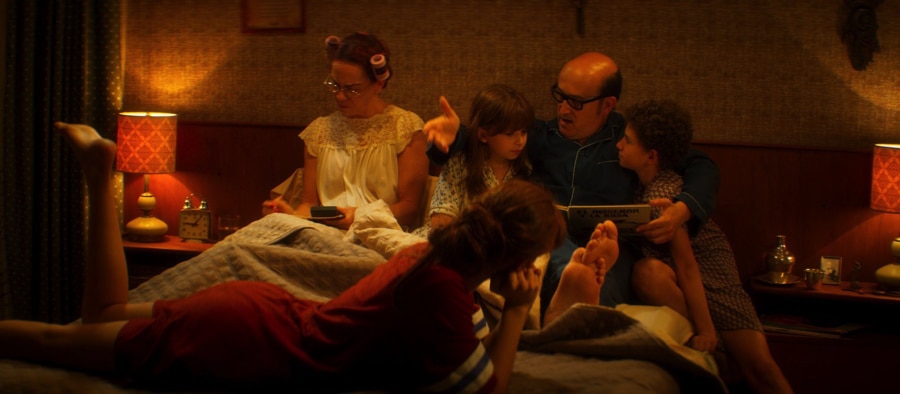




Dir.: Fernando Trueba; Cast: Javier Camara, Juan Pablo Urrego, Nikola Reyes Cano, Patricia Tamayo, Maria Teresa Barretyo, Laura Londano, Elisabeth Minotta, Kami Zea; Columbia 2020, 136 min.
Memories of My Father in a spirited family saga set against the background of Columbia’s darkest days.
Based on the (auto)biographical novel ‘El Olvido Que Seremos’ by Hector Abad Faciolince, Spanish director Fernando Trueba and his brother David set their story in the city of Medellin, where fiery militias took the law into their own hands. Both novel and film are a tribute to the Columbian human rights advocate and doctor Hector Abad Gomez, by his son Hector ‘Quiquin’ Abad Faciolince.
The story opens in a monochrome Turin in the early 1980s where student Hector Abdad (Urrego) is watching a South American gangster movie with a girl friend. We hear him later on the phone to his mother Cecilia Faciolence de Abad (Tamayo) discussing his father’s rebellious nature. Glorious colours then flood the screen as we revisit Hector’s ‘Quiquin’ (Cano) childhood world, dominated by his compassionate father (Camara) and his four sisters: teenage Mariluz(Barreto), Clara (Londano), Marta (Zea) and Vicky (Minotta.)
Medellin was a turbulent place to grow up: bombs went off regularly, right-wing militia terrorised the population, drug cartels fought it out, and at university fascist professors made life difficult for Abad Gomez. At home, matriarch Cecilia keeps the family finances in order, whilst Clara changes boyfriends regularly and Marta sings melancholic songs, playing the guitar.
Quiquin and his school friend are up to no good – throwing stones at the window of a Jewish family living next door. The school boys are victims of a reactionary aunt, a nun, who tells Quiquin that the Jews killed Jesus Christ and should be punished. Father Hector takes his son to the neighbours and makes him apologize. The same school friend asks Quiquin “if his father was gay” – since Hector senior likes to cuddle his only boy. The youngster is soon fed up with religion and God, and is ordered by his father to attend church to please his mother. The grandmother is sent to a care home, and Cecilia’s brother, a bishop, warns Hector to be more careful with his critique of the government and militia.
But the lack of sanitation in the poor quarters is appalling, and the doctor is the only one, who cares to get prosthesis’ for the victims of bomb attacks. On the radio, the family listens to accusations against the patriarch, he is branded a Marxist, soon having to leave the country to teach abroad. Then tragedy strikes at the heart of the family and life is never the same.
The feature then circles back to 1983 and black-and-white footage seeing Hector returning to Medellin, where father and son are more and more estranged, since the young man does not understand his father’s social engagement. The first grandchild in the family is born, and Doctor Gomez announces that he is going to run for mayor of the city in 1987. After family tragedy, the scene is now set for confrontation.
DoP Sergi Ivan Castano can take much credit for this engrossing family saga, sometimes told in the style of a tele-novella. The black-and-white images are wonderfully lit, and the colour scenes at the heart of the feature are so vibrant in their crystalline intensity you almost have to squint. The directors avoids a political treaty, focus on the emotional conflicts. Memories is a testament to a man of passion and compassion. ©AS
CURZON HOME CINEMA exclusively from 26th March 2021